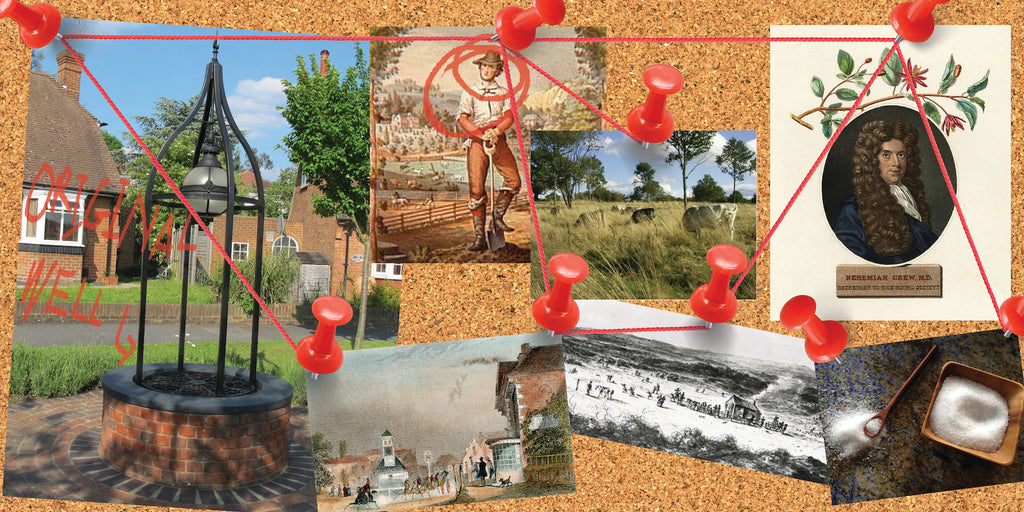
This salt has a long history of suspicious water, unscrupulous business dealings, and high society. The town of Epsom was thrusted into the limelight because of a man and his cow. For over 100 years, Epsom was the destination to be for rest and relation. Eager businessmen keen to get a cut of the profits rushed to capitalize on a new discovery; some helped Epsom grow, others lied and stole to get to the top. The story of Epsom England altered England's, subsequently Europe’s, idea of a vacation destination, ultimately leading to the creation we now know as Epsom salt.
A discovery is made
The blistering summer heat of 1618, Henry Wicker, a local cow herder, walks around Epsom Commons to find his cows some water. After finding a small pool of water, Henry is shocked his cows refused to drink. Curiously, he tries the water himself, Wicker remarks at the bitter taste and noticed the salt remained after evaporation. He later felt the remarkable effects of the water. It helped clear up sores and purge his body. Word spread around the small town of Epsom and Nehemiah Grew, a chemists and botanist, performed the first chemical analysis on the water and established what gave Epsom’s water its medicinal qualities, Magnesium Sulfate! The town of Epsom boomed, people traveled to Epsom to drink its miracle water.
The making of a gem.
High society flocked to Epsom craving their water and its benefits, the water was so popular the well ran dry three times in the morning the town grew into a posh retreat. Only 15 miles (24 Km) from London, distinguished guests flocked to Epsom including kings and queens. Subsequently, Spas explode with popularity around Britain and Europe. In the early seventeenth century, places across Europe were promoted as spas and good for your health. People flock to places with water with healing properties often being prescribed by a doctor; visitors were prescribed for several weeks to drinking the water daily. Epsom became the one of the foremost spas in Europe.
With success comes competition, a man named John Livingston who professed he had found a new well. No need to make the 30 minute walk from town to the original well. He added entertainment in his well and the wells became a social and engaging place to be. Livingston promoting the benefits of the waters and the town. Looking deeper, Livingston acquired the land for his new well using some under-handed methods. Leasing the land from a tenant, who was not allowed to sublet her lease, and Later buying the property. His new well was so successful he bought the original well. Years later closing the original well to the public and bottling the original well’s water and selling it at his new well and in London. Livingston did a great deal to help Epsom; developing the fairs, markets, and theatrical performance. Looking deeper into Livingston, he was a shrewd businessman with questionable business ethics, however, he is deemed to be the most successful promoter of Epsom until his death in 1727.
Inns and taverns popped up to capitalize on the hordes of new visitors, places for dancing, music, and card games developed as well. Patrons of the wells danced and played cards until three in the afternoon. Livingston built his own Tavern and an Inn house. Epsom created one of the earliest horse races. By the 18th century merchants had moved their homes out from London into the neighborhoods of Epsom. From 1600, prior to Henry’s discovery, and 1670, the county of Surrey where Epsom is located, the population went from 84,000 to 124,000 people.
Crash of a shooting star.
Epsom’s foothold as a spa destination was under threat. By 1715, it was evident that the water of the New Wells was not as effective as that of the old well, and the reputation of both declined. New and better wells were dug with better facilities in other towns. These towns were gunning for Epsom’s crown. Public Baths came into vouge and every town wanted to be the next spa destination. The Town of Bath and Tunbridge took the crown. Royalty and nobility flocked to Bath and Tunbridge, places close to London were looked down on. Spas further away had a better social allure associated with them. Daniel Defoe, Famous writer and spy, said ‘the nobility and gentry go to Tunbridge, the merchants and rich citizens to Epsom … the common people chiefly to Dulwich and Streatham’. Epsom’s Dominance as a spa destination began to slip. In 1720, the populariry of spas declined.
Opponents of John Livingston attacked his reputation. Advertisements were placed launching terrible accusations against him, calling him “avariciousness midwived designedly the miscarriage of Epsom”. Later authors called him an “an unprincipled speculator.” These allegations were believed until the 1900s’, about 173 years after his death, when new records were made public. Many of these allegations come from an false advertisement in a local newspaper at the time.
Nehemiah Grew, after his initial chemical analysis of Epsom’s water, found a way to mass-produce Epsom Salts. Epsom’s two wells were not fit for mass production. Grew was granted a Royal patent for "The Way of Makeing the Salt of the Purgeing Waters perfectly fine in large quantities and very Cheape,”. Believing he had the exclusive right to manufacture Epsom Salts, he began to set up a manufacturing facility to produce Epsom salt where he hoped to make 20,000 lbs. per year. A contest for the patent was raised by brothers Francis and George Moult. Francis published an unauthorized translation of Grew’s book from Latin to English. Also advertised the sale of the book and the salts, and undercut Grew’s price. This was bad news for Epsom and spa destinations. Epsom Salts were soon cheaply available over the counters. This meant that there was no longer any need to go to a spa destination for the miracle effects.
The dye was cast for Epsom – its water supply was limited and the scraping of the bottom often made it cloudy. The volume of water from the two Epsom wells never large enough to keep up with the demand and other destinations had better facilities. There were also suspicions of dilution. Celia Fiennes, Writer and traveler, on her first visit says: ‘its not a quick spring and very often is drank dry, and to make up the deficiency the people do often carry water from common wells to fill this in a morning (this they have been found out in) which makes the water weak and of little operation‘. It is not surprising that Epsom could not compete with places where there was an abundance of water. The diluted waters were less effective than the original well, and made patrons suspicions of a scam. Doctors became unwilling to send their patients to the waters because the waters had reduced effects.
When the interest in the spa declined in the early eighteenth century, horseracing attracted the visitors, especially after the Derby was established in 1780. Epsom did well because of the commercialization of the town from all the visitors. However, Epsom was not the posh destination anymore and the eyes of kings and nobles have moved on. The new hot thing in the mid 1700s’ was sea side towns. Livingston’s Well was built over in 1804, but the original can still be seen in Epsom.
Epsom's glory days were behind them. The trend of a spa destination had faded. The wealthy, nobility, and merchants had their vacations planned in other locations. Diluted waters lost the patrons trust and limited its effectiveness. The lost the effectiveness of the waters limited doctor referrals. Epsom Salts had become cheap solutions to get the effects of the waters, and were available over the counter. Epsom was no longer the bustling place it once was.
Epsom salt today
Epsom Salt is found naturally in mines and limestone caves. Despite the limited supply of water from Epsom’s wells, Epsom Salts will never be in short supply.
Magnesium is essential to all life on Earth, it is at the heart of the chlorophyll molecule, which plants use to convert carbon dioxide into glucose, the plant's food source. Over 90 enzymes in the body require magnesium ions for their catalytic activity. Magnesium is the seventh most abundant element in the Earth's crust, and third most abundant if the Earth's mantle, The element is also abundant in sea water. The magnesium in the Epsom Salt is what makes them so effective.
Epsom salt have been known to relieve pain and soothe your body since the 1600s’. In more modern applications, Epsom salts can be even be used to clean your washing machine and gardening. Epsom-It uses Epsom Salt in our lotions as the main ingredient to help soothe muscle and nerve discomfort. The salt soaks into your skin through the hair follicle to focus on desired areas.
Sources
https://archive.org/details/surreyarchaeol57surr/page/n3/mode/2up
https://edu.rsc.org/elements/magnesium/2020016.article
https://www.visionofbritain.org.uk/census/GB1841ABS_1/6
https://www.apartmenttherapy.com/a-brief-history-of-epsom-salt-242655
https://epsomsalts.co.uk/index.php?main_page=page&id=25
Sakula A. The waters of Epsom Spa. J R Coll Physicians Lond. 1982 Apr;16(2):124-8. PMID: 7042963; PMCID: PMC5377747.

Leave a comment